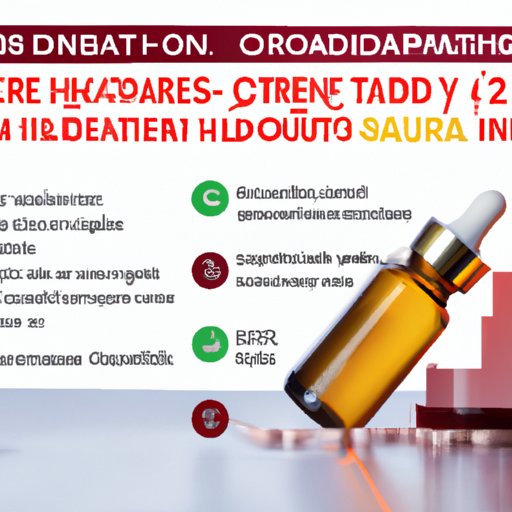How Long Does CBD Stay in Your Blood?
Cannabidiol, commonly known as CBD, is a natural compound derived from the cannabis plant. It has gained massive popularity in recent years due to its potential health benefits, such as reducing anxiety, easing chronic pain, and improving sleep. However, as with any substance, it’s essential to understand how long CBD stays in your bloodstream.
Knowing the duration of CBD in your system can help you make informed decisions about dosages, timing, and consumption methods. It can also help users avoid any unexpected consequences when undergoing drug tests or taking other medications.
In this article, we’ll explore the science behind the duration of CBD in your bloodstream, the variables that affect it, the pros and cons of different consumption methods, and testing guidelines for employers and athletes. We’ll also discuss the legal landscape of CBD and its impact on drug test results.

Exploring the Science Behind the Duration of CBD in Your Bloodstream
When you consume CBD, it enters your bloodstream, where it interacts with the endocannabinoid system (ECS). ECS plays a crucial role in regulating various physiological processes, such as pain, inflammation, sleep, and appetite.
Once in the bloodstream, the liver metabolizes CBD into more than 100 compounds known as metabolites. These metabolites are then excreted from the body through urine or feces. The concentration of these metabolites in the bloodstream determines how long CBD stays in your system.
Half-life is the time it takes for half of the consumed substance to be eliminated from your system. The half-life of CBD varies depending on several factors, such as dosage, frequency of use, and metabolism of the individual.

The Variability of CBD: Factors That Affect How Long it Stays in Your System
The duration of CBD in your system is highly variable and depends on several factors. Here are some of the critical elements that impact how long CBD stays in your bloodstream:
Body composition and metabolism
People with higher body fat levels tend to store CBD for more extended periods since CBD binds to fat molecules. Likewise, people with a slower metabolism will eliminate CBD metabolites more slowly.
Dosage and frequency of use
The higher the dosage and frequency of use, the longer CBD stays in your system.
Quality and potency of the CBD product
The quality and potency of CBD products vary widely. High-quality products are more potent, and their effects last longer. Moreover, low-quality products may contain other chemicals or compounds that can affect the half-life of CBD in the bloodstream.
Interaction with other medications or substances
When consumed with other substances, CBD can interact with them, leading to various effects. Substances such as alcohol and tobacco can affect the metabolism of CBD, while THC can amplify its effect.
Overall health and lifestyle factors
Your overall health and lifestyle can affect how long CBD stays in your system. Factors such as stress, poor nutrition, and lack of sleep can slow down the metabolism of CBD.
The Pros and Cons of Different CBD Consumption Methods and Their Impact on Disposition Time
CBD products come in various forms, including inhalation, sublingual ingestion, oral ingestion, and topical application. Each method has its pros and cons, and their effects on the duration of CBD in your system vary.
Inhalation
Inhalation is one of the most common forms of consuming CBD. It involves smoking or vaping CBD products, where the substance is absorbed through the lungs and enters the bloodstream immediately.
Onset Time: Seconds to minutes
Duration of Effects: 1-3 hours
Bioavailability: High
Sublingual ingestion
Sublingual ingestion involves placing CBD oil beneath the tongue, where the substance is absorbed through the mucous membranes and then enters the bloodstream.
Onset Time: 20-40 minutes
Duration of Effects: 4-6 hours
Bioavailability: High
Oral ingestion
Oral ingestion is the consumption of CBD products through the mouth, such as CBD edibles, where the substance is metabolized in the liver before entering the bloodstream.
Onset Time: 30 minutes to an hour
Duration of Effects: 6-8 hours
Bioavailability: Low
Topical application
Topical application involves applying CBD products directly to the skin, where it’s absorbed through the pores and interacts with cannabinoid receptors in the body.
Onset Time: 15-45 minutes
Duration of Effects: 2-3 hours
Bioavailability: Low

Understanding CBD Testing: What Employers and Athletes Should Know About Detection Windows
Drug testing for CBD is becoming increasingly common due to regulatory requirements and safety concerns. Employers and athletes need to understand how CBD consumption can affect drug test results.
There are various drug testing methods for CBD, such as urine, hair, and blood tests. The detection window for CBD varies depending on the method of consumption.
Urine tests are the most common drug testing method for CBD. They can detect CBD metabolites for up to three days after consumption. Hair tests can detect traces of CBD for up to three months, while blood tests can detect CBD for up to two days.
However, the accuracy of these tests can vary widely. False positives are common when testing for CBD, especially when using low-quality products. Therefore, it’s essential to use high-quality and reputable CBD products and consult a healthcare provider before consuming them.
The Legal Landscape of CBD: How Long-Term Use Can Affect Drug Test Results
CBD is considered legal under federal law, provided it contains less than 0.3% THC. However, its legal status varies widely from state to state. In some states, it’s fully legal, while in others, it’s still illegal.
Long-term use of CBD can affect drug test results, even when consuming low-THC products. THC, the psychoactive component of cannabis, can accumulate in the body over time, leading to a positive drug test.
Therefore, it’s essential to be cautious when consuming CBD products over long periods. Consulting a healthcare provider and researching the legal status of CBD in your state can help prevent any legal or professional consequences.
Conclusion
Understanding how long CBD stays in your system is crucial for making informed decisions about consumption methods, dosages, and timing. The duration of CBD in the bloodstream varies depending on several factors, including body composition, metabolism, dosage, and quality of the product. Different consumption methods have varying impacts on the duration of CBD in the system. Testing guidelines for employers and athletes are essential for avoiding any consequences of consuming CBD. Moreover, the legal landscape of CBD is essential to avoid any legal or professional repercussions. Therefore, users should be cautious when consuming CBD products and seek expert advice before use.
